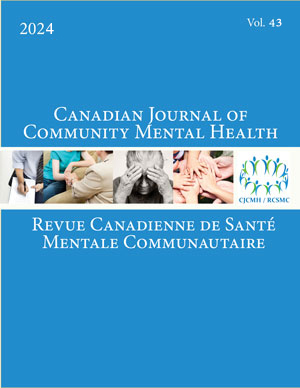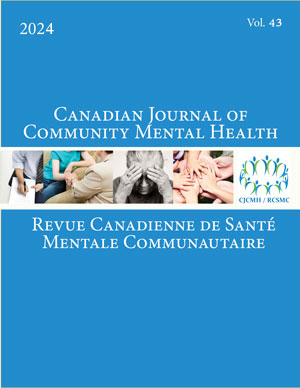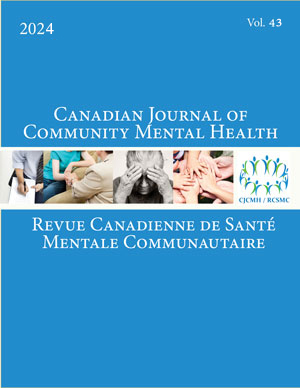Volume 35 • Number 3 • December 2016
Articles
OPEN ACCESS
Risks of mental health issues (e.g., depression, anxiety/mood disorders, and suicidality) are found to be elevated among Canadian gay, bisexual, and men who have sex with men (GB-MSM). We studied factors impacting mental health care use in a community sample of 202 GB-MSM in London-Middlesex, Ontario. Our results show that, for the entire sample, experiences of both homophobia and internalized homonegativity are associated with increased prevalence of mental health service use over the past year, and suggest that service use is lower among immigrant GB-MSM than among those born in Canada. Implications for mental health and social service providers are discussed.
OPEN ACCESS
The objective of this pilot project was to evaluate the effectiveness of the FRIENDS program in reducing anxiety and symptoms of depression for children in Regina public schools. The project comprised 461 children in Grades 1, 4, 5, and 6 who participated in the 10-week FRIENDS program between September 2013 and May 2014. Effectiveness of the program was measured using the Revised Children’s Anxiety and Depression Scale, which was administered at the beginning and end of the program. The percentage of children with subclinical or clinical levels of anxiety and depression significantly decreased from 21.8% to 13.4%. This study validated the effectiveness of the FRIENDS program in children in Regina schools.
OPEN ACCESS
La prévention est une des premières missions des psychologues hospitaliers et territoriaux en France. Les constats actuels font état d’un faible investissement de ces professionnels et professionnelles en prévention primaire, au profit d’une intervention davantage centrée sur les troubles psychiques et la prévention secondaire. Cette étude qualitative visait à investiguer les représentations sociales des psychologues par rapport à cet objet prévention. En outre d’une attitude positive à l’endroit de la prévention, les résultats font état d’un discours principalement centré sur les enjeux sanitaires de la prévention et sur les risques de la mise en place de nouvelles politiques publiques de prévention.
OPEN ACCESS
In this paper, we outline three genealogies of housing policy in Canada—affordable housing, mental health housing, and housing for homeless persons—and present the focus, research, and strengths/critiques of these genealogies. The increased visibility and adoption of Housing First (HF) in Canadian policy has created tension between groups working on housing and homelessness. Critics rightly point out that HF does little to increase the availability and accessibility of affordable housing. We discuss the homelessness sector as a bridge between the affordable housing sector and the mental health sector and outline how collaboration might take shape in addressing homelessness and affordable housing in Canada.
OPEN ACCESS
Interprofessional relationships between youth workers and mental health service providers are now understood as an integral aspect of mental health literacy and care provision. This paper reports on findings from an online survey exploring youth workers’ (N = 74) perceptions of mental health literacy, specifically in regards to interprofessional relationships in Canada. Discourse analysis of participants’ qualitative responses revealed three themes: constructing us/them binaries, differential positioning contributing to collaboration, and hierarchical differential positioning contributing to learned helplessness. Constraining and supporting conditions for collaboration include organizational structures and policies that support the development of interprofessional relationships, knowledge of different professions’ roles and responsibilities, and respectful experiences during collaboration.
OPEN ACCESS
Interprofessional care (IPC) represents a high degree of collaboration among health professionals to provide comprehensive treatment to clients. Despite increased uptake of IPC in mental health care, few studies have examined its clinical effectiveness in actual practice. A retrospective cohort study examined the treatment outcomes for 183 outpatients with chronic and comorbid mental health difficulties treated with IPC in a community mental health setting. Multilevel modelling demonstrated that clients reported statistically significant improvement in mental health symptoms and functioning during IPC, relative to a waitlist interval. Furthermore, fewer clients reported clinically significant difficulty with symptoms and functioning over the course of treatment with IPC. Findings suggest that IPC may be an effective treatment in outpatient community mental health settings for Canadian adults presenting with chronic and comorbid psychopathology and affected psychosocial functioning.
OPEN ACCESS
This study analyzed a retrospective sample of articles from 12 major Canadian newspapers to characterize messages about depression in print media. Major themes were positive and focused on promoting awareness and disseminating research findings. Stories often relied on expertise, but seldom included input from those affected by a mental illness. More than half the articles used improper language. Articles rarely provided information to find additional resources. Findings may guide future analyses and programs aimed at improving media coverage of mental illness.
Practice Innovations
OPEN ACCESS
Inpatient care for adults with eating disorders in Canada is limited. An innovative outpatient interdisciplinary approach and a service use example are presented. With no current benchmark, this approach may offer a practical solution for outpatient teams seeking to be helpful when service users are left to wait for inpatient care.
OPEN ACCESS
The Caregiver Series, an initiative started in 2013 by the Quality Improvement and Education Team within Children, Youth, and Families, Addiction and Mental Health, Alberta Health Services, aims to provide caregivers and individuals with information about mental health and addiction issues within childhood and adolescence. Knowledge mobilization, collaborating and partnering with schools, taking into account adult learning principles when creating sessions, focusing on high quality content delivered by mental health professionals, decreasing barriers when possible, and incorporating feedback for ongoing quality improvement, are the characteristics that have been a large contributor to the success of the series.










